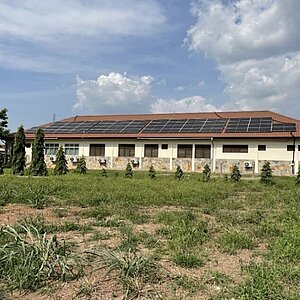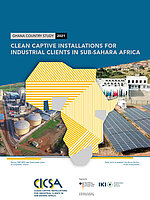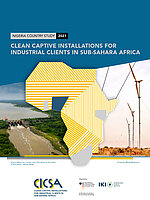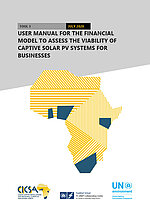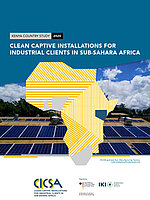Clean captive installations for industrial clients in Sub-Sahara Africa
In sub-Saharan Africa, the manufacturing sector is often faced with the challenge of securing a cheap and reliable source of electricity. Backup diesel generators are in widespread use. This project was trialling business models for renewables for industrial clients. Renewable energy sources that can replace fossil backup systems operate independently of feed-in tariffs and are cheaper than owned fossil generation. As a result, they are beneficial to manufacturers and utility companies alike. The project used pilot installations to demonstrate the economic viability of these systems. In each target country, the project supported companies in their efforts to develop renewable energy projects at industrial sites and introduces replicable business models. Figures for plant power generation are published so as to increase transparency while reducing assumptions about investment risks. Business models were fully documented and toolkits are provided to encourage take-up by other companies.
- Countries
- Ghana, Kenya, Nigeria, South Africa
- IKI funding
- 3,483,766.44 €
- Duration
- 04/2019 till 09/2023
- Status
- completed
- Implementing organisation
- United Nations Environment Programme (UN Environment)
- Political Partner
-
- Department of Trade, Industry and Competition (DTIC) – South Africa
- Federal Ministry of Environment - Nigeria
- Ministry of Energy - Ghana
- Ministry of Energy and Petroleum, Directorate for Renewable Energy - Kenya
- Ministry of Environment, Science, Technology and Innovation (MESTI) - Ghana
- Ministry of Environment and Forestry - Kenya*
- South African National Energy Development Institute (SANEDI)
- Implementing Partner
-
- Frankfurt School of Finance & Management gGmbH
State of implementation/results
- Project completed.
- In Sub-Saharan Africa, the manufacturing sector is often faced with the challenge of securing a cheap and reliable source of electricity. Backup diesel generators are in widespread use. This project is trialling business models for renewables for industrial clients. Renewable energy sources that can replace fossil backup systems operate independently of feed-in tariffs and are cheaper than owned fossil generation. As a result, they are beneficial to manufacturers and utility companies alike. The project is using pilot installations to demonstrate the economic viability of these systems. In each target country, the project supports companies in their efforts to develop renewable energy projects at industrial sites and introduces replicable business models. Figures for plant power generation are published so as to increase transparency while reducing assumptions about investment risks. Business models are fully documented and toolkits are provided to encourage take-up by other companies.
- Three pilot projects have been selected in Kenya. In Ghana, Nigeria and South Africa one project each has been selected.
- Kenya: www.captiverenewables-africa.org/…
- Ghana: www.captiverenewables-africa.org/…
- Nigeria: www.captiverenewables-africa.org/…
- South Africa: www.captiverenewables-africa.org/…
- Press releases have been published on important project milestones in the project's website.
- Gender fliers were developed. In recognition of the importance of gender mainstreaming in the implementation of project activities and its output as reflected in the project document, gender has been a consideration during the initial scoping missions, in the selection of pilot projects, and will also be considered in the monitoring phase of the project. Further, aiming to address gender at a higher level, and from a public and private level perspective, the project team has developed two fliers:
- The first flier targets the private sector and is focused on the employment of women in the energy transition. It addresses the barriers facing women in the RE sector by analysing beliefs, practices, context, and opportunities; including practices that can be put in place to promote inclusion.
- The second flier is oriented towards the public sector and focuses on women participation in the captive renewable sector in C&I. It contains recommendations for public institutions oriented towards encouraging female participation, including stakeholder engagement, and leading by example.
- Economic and financial tools for assessing suitable financing structures of clean captive installations have been developed and published.
- To select pilot projects scoping missions to all project countries have been completed, project selection criteria have been defined and online seminars conducted to call for proposals.
- Lessons learned, including country-specific studies on captive RE business models and case studies on supported pilot projects, have been developed and disseminated.
- An end-of project brochure has also been developed and disseminated.
- End-of-Project national workshops in the four partner countries have been organized between April and June 2024, at which knowledge and project results in the country and beyond have been disseminated with a view to fostering an uptake in private sector clean captive installations.
- A Regional Workshop was held in June 2023 in Pretoria, South Africa with over 50 participants from governments, industries, and regional bodies attended. A Pretoria workshop statement that reflects a clear roadmap and pathway in the development of a regional programme on the viability of clean captive power for the commercial and industrial market in African countries was developed.
- More information, including the country studies, the tools and on projects selection are available on the project website.
Latest Update:
02/2026
Project relations
Legend:
The link has been copied to the clipboard
Related Publications
-

-

-

-

-

-

-

-
 09/ 2020 | Tool/Open source product
09/ 2020 | Tool/Open source productCICSA Tool 4: Best Available Technology for Solar PV Captive Systems
English (PDF, 1 MB)
-
 09/ 2020 | Tool/Open source product
09/ 2020 | Tool/Open source productCICSA Tool 3: User Manual for the Financial Model to assess the viability of captive solar PV systems for businesses
English (PDF, 754 KB)
-
 09/ 2020 | Tool/Open source product
09/ 2020 | Tool/Open source productCICSA Tool 2: Cost Benefit Analysis of Renewable Energy Programmes
English (PDF, 2 MB)
-
 09/ 2020 | Tool/Open source product
09/ 2020 | Tool/Open source productCICSA Tool 1: Financing Guidelines and Checklist
English (PDF, 1 MB)
-




